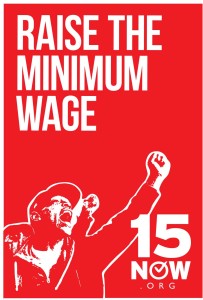by Sam Pelletier
This year, in Portland, we’re voting on a minimum wage of 15 dollars per hour. Their initiative also significantly raise the wages of tipped workers, who were thoroughly peed on by the Portland City Council earlier this year.
Usually when faced with things like this I would mull over whether it’s too radical, especially since some of my colleagues at this paper are self-described “anti-capitalists.” Luckily, for both myself and big government in general, I don’t have to decide at all. I committed myself to this kind of policy last month when I endorsed the Democratic presidential front-runner.
Here’s the rub on Bernie’s stance: it includes a more substantial hike than what is proposed here in Portland. Follow me a little on this: Sanders wants minimum wage to be fifteen dollars on a federal level. Another way of saying that is he wants the minimum wage to be at least fifteen in every single place in the United States, no matter how small and cheap. He wants a fifteen dollar minimum wage in a township whose economy consists of a truck stop. There’s no internet, but there’s a “story hole” at ear level in the bathroom. An employee will read you stories through it, and they make fifteen an hour.
Supporting Bernie doesn’t mandate that you support his wage target, but it is one of his key issues. Bernie supporting $15.00/hour isn’t a one-day-story like Bernie supporting drone strikes. American voters care about it, and the campaign has legitimately made it one of their central points. This has lead me toward supporting the Green’s initiative, because if I can entertain fifteen across the board, I should insist on fifteen for my fellow citizens of the Queen City.
Stuff costs more here. Our economy pretty much tailors to rich people. The kind of rich people that actually have tailors. Besides the tourism in the summers, many of the people who work, shop, and drink in Portland drive here from affluent suburbs.
I bring this up because I’m not sure the minimum wage should be fifteen everywhere. It’s a significant change for businesses and shouldn’t be raised just for the sake of raising it. That being said, when it’s much too low, that causes problems, specifically with how poor people pay for their goods.
The welfare cliff is real, and it’s friggin scary, Bub. I’ve known plenty of people who are scared to return to the workforce because they’ll lose benefits when they do. This always has to do with the fact that when “returning” to the workforce, you’re likely to start at a low-wage job.
If we raise that wage significantly rather than moderately, we can ensure that people who want to work have more economic freedom. Also, because people everywhere respond to incentives, we don’t have to be mean or pandering when making this case.
Will it raise prices? Maybe, but if at all not by very much. Inflation is caused by a lot of different factors like the Federal Reserve, gas prices, the stock market, currency trading by China, currency manipulation by China, the Federal Reserve again, and Tom Brady’s suspension getting pulled. Portland is already expensive (especially housing), not because of anything government does but because we’re a tourist destination surrounded by rich people.
Does raising the minimum wage mean less jobs? Yes. Labor is a market. If you charge more for something, people buy less of it. There would probably be more jobs if there was a lower minimum wage, more still if there was no minimum wage. Right now however, a person seeking employment is not just hindered by a lack of jobs, they’re hindered by competitors working multiple jobs because of how ridiculously little those jobs pay.

Sam Pelletier performs comedy throughout New England and hosts a weekly stand-up comedy night at b.good Portland on Mondays.
Does it hamper small business? Somewhat. Like any rule government makes, money must be spend to comply with it. The good news on the minimum wage is that it’s really simple.
Many regulations inherently favor large businesses because they’re complicated, and big players have more to spend in advance understanding what compliance is. The minimum wage can be enforced equally because it can be explained in one sentence: pay people no less than X.
All of Maine and most of America needs a significant raise. If the minimum wage was a school kid, he wouldn’t be “losing focus,” he’d be spitting chunks of glue at the dioramas.
In Portland, where people are already getting priced out, where the cost of living really is significantly higher than the rest of the state, fifteen makes sense. I’ll be voting yes.







1 Comments
Ted
The minimum wage is really really really stupid. Seen from the socialist view that the greedy capitalists are exploiting you and we can punish them by mandating that they cannot pay less than $15/hr, it sounds great! Unfortunately we don’t live in a cartoon. In the real world wages are negotiated between employer and employee. Effectively, the minimum wage makes it illegal for you to OFFER your services for less than $15/hr. Sure, for many jobs you’d be making more than that, so it makes no difference, but on the whole it will mean less jobs for low skilled workers. It will mean more people welfare and other types of government assistance. Why? Because, in order for someone to be paid $15/hr, they need to produce more than that with their labor. So people with low skills (teenagers, people who cannot speak English, hipsters, etc) will need to be able to produce not $15/hr but more – a lot more. Businesses work by generating a profit – that evil concept by which we all feed ourselves and are able to live and love life.
So if you want to get your foot in the door at a record label or a film company, or a newspaper/magazine, or whatever your “dream job” might be, you might say “look, I’ll show up and work for FREE! I just want to get a foot in the door in this industry.” they’ll say “That would be awesome, but the law requires that I pay you $15/hr, and we can’t afford to do that – sorry.”
Furthermore, minimum wage jobs necessitate the need to hire undocumented immigrants who are willing to work for less than the minimum wage. They aren’t protected by the law the way we are because they’re here illegally – so the “exploitation” that leftists claim to want to eliminate will be perpetuated by this well-intentioned but utterly misguided and naive law.
Here’s how the real world works: You’re the boss. You’re selling widgets. Each widget costs you $1 to make. You want to sell them for $10, or even $100, but the more you charge, the less people buy them. If you charge less than $1, you will go out of business. Even if you charge $1.20, you might go out of business. you are competing with other widget manufactures who sell a similar product, and the pressures of your costs and your competition bring you, naturally, to a price. The price may be $3. Labor is the same way. Workers who take a job are selling their labor. You’d love to charge $100/hr, but at that rate, no one will buy it. You can’t charge $1/hr because that’s not enough to live on. So, you compete with other laborers for the business of the employers. One business offers you $9.50, another offers you $12. You go wherever you can get the best deal, and with work comes experience and with experience one can demand a higher pay because they are now able to produce that much more. Artificially setting a bottom to this pay rate will only work if the bottom is lower than what the actual market decides it should be, and in that case no bottom would be necessary anyway.
These idiotic policies are what is driving prices UP in Portland. Bernie Sanders is dead wrong on this and many other issues.